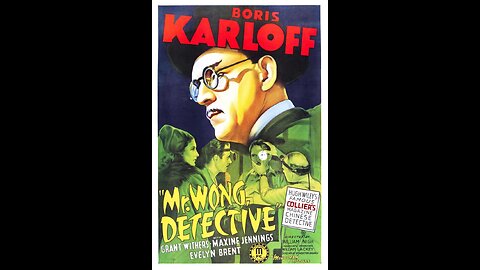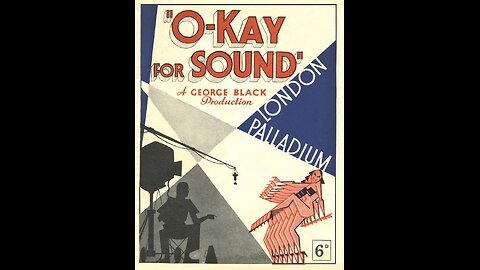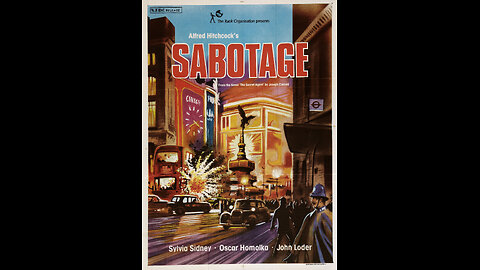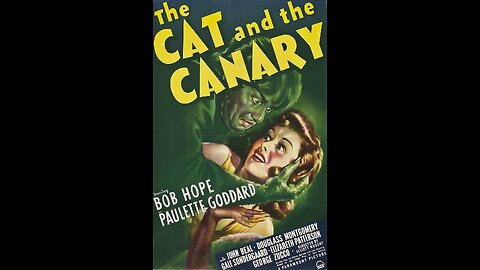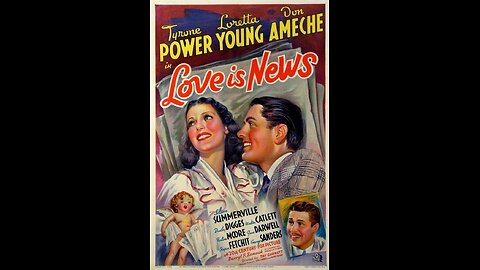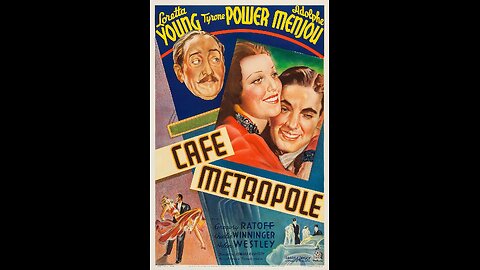
1930-1939 Movies
139 videos
Updated 11 days ago
The Best of Anglo American Films from 1930-1939
-
Dead End (1937) | Directed by William Wyler
 Classic Films & Movies Archive"Dead End" is a 1937 American crime drama directed by William Wyler. The film portrays the intersecting lives of affluent residents and impoverished tenants in a New York City neighborhood adjacent to the East River. Central to the narrative are the Dead End Kids, a group of streetwise youths, and the notorious gangster "Baby Face" Martin, who returns to his old neighborhood, confronting his past and the harsh realities of urban life. Genre: Crime Drama Director: William Wyler William Wyler (1902–1981) was a renowned American filmmaker known for his meticulous direction and ability to elicit powerful performances from actors. His illustrious career includes classics such as "The Best Years of Our Lives" (1946), "Roman Holiday" (1953), and "Ben-Hur" (1959), the latter earning him an Academy Award for Best Director. Star Cast: - Sylvia Sidney as Drina Gordon - Joel McCrea as Dave Connell - Humphrey Bogart as Hugh "Baby Face" Martin - Wendy Barrie as Kay Burton - Claire Trevor as Francey - Allen Jenkins as Hunk - Marjorie Main as Mrs. Martin - Billy Halop as Tommy Gordon - Huntz Hall as Dippy - Bobby Jordan as Angel - Leo Gorcey as Spit - Gabriel Dell as T.B. - Bernard Punsly as Milty Upon its release, "Dead End" received critical acclaim for its compelling narrative and strong performances. The film was nominated for four Academy Awards, including Best Picture, Best Art Direction (Richard Day), Best Cinematography (Gregg Toland), and Best Supporting Actress (Claire Trevor). The portrayal of urban poverty and crime resonated with audiences and critics alike, solidifying its status as a significant work in American cinema. Fun Facts: 1. The film is an adaptation of Sidney Kingsley's 1935 Broadway play of the same name. 2. "Dead End" marked the film debut of the Dead End Kids, a group of young actors who gained popularity and went on to appear in numerous films over the next two decades. 3. The elaborate set design recreated a New York City slum neighborhood on a Hollywood soundstage, showcasing the film's commitment to authenticity. 4. Humphrey Bogart's role as "Baby Face" Martin contributed to his rising prominence in Hollywood, leading to more significant roles in subsequent films. 5. The film's exploration of social issues, such as the disparity between wealth and poverty, reflects the socio-economic climate of the 1930s. * This Rumble Movie Channel is comprehensively indexed on https://kinoquick.com - find you favourite movies fast & free! Subscribe to this channel to be notified of daily movie updates.152 views
Classic Films & Movies Archive"Dead End" is a 1937 American crime drama directed by William Wyler. The film portrays the intersecting lives of affluent residents and impoverished tenants in a New York City neighborhood adjacent to the East River. Central to the narrative are the Dead End Kids, a group of streetwise youths, and the notorious gangster "Baby Face" Martin, who returns to his old neighborhood, confronting his past and the harsh realities of urban life. Genre: Crime Drama Director: William Wyler William Wyler (1902–1981) was a renowned American filmmaker known for his meticulous direction and ability to elicit powerful performances from actors. His illustrious career includes classics such as "The Best Years of Our Lives" (1946), "Roman Holiday" (1953), and "Ben-Hur" (1959), the latter earning him an Academy Award for Best Director. Star Cast: - Sylvia Sidney as Drina Gordon - Joel McCrea as Dave Connell - Humphrey Bogart as Hugh "Baby Face" Martin - Wendy Barrie as Kay Burton - Claire Trevor as Francey - Allen Jenkins as Hunk - Marjorie Main as Mrs. Martin - Billy Halop as Tommy Gordon - Huntz Hall as Dippy - Bobby Jordan as Angel - Leo Gorcey as Spit - Gabriel Dell as T.B. - Bernard Punsly as Milty Upon its release, "Dead End" received critical acclaim for its compelling narrative and strong performances. The film was nominated for four Academy Awards, including Best Picture, Best Art Direction (Richard Day), Best Cinematography (Gregg Toland), and Best Supporting Actress (Claire Trevor). The portrayal of urban poverty and crime resonated with audiences and critics alike, solidifying its status as a significant work in American cinema. Fun Facts: 1. The film is an adaptation of Sidney Kingsley's 1935 Broadway play of the same name. 2. "Dead End" marked the film debut of the Dead End Kids, a group of young actors who gained popularity and went on to appear in numerous films over the next two decades. 3. The elaborate set design recreated a New York City slum neighborhood on a Hollywood soundstage, showcasing the film's commitment to authenticity. 4. Humphrey Bogart's role as "Baby Face" Martin contributed to his rising prominence in Hollywood, leading to more significant roles in subsequent films. 5. The film's exploration of social issues, such as the disparity between wealth and poverty, reflects the socio-economic climate of the 1930s. * This Rumble Movie Channel is comprehensively indexed on https://kinoquick.com - find you favourite movies fast & free! Subscribe to this channel to be notified of daily movie updates.152 views -
House of Secrets (1936) | American mystery film directed by Roland D. Reed
 Classic Films & Movies Archive"House of Secrets" is a 1936 American mystery film directed by Roland D. Reed. The story follows a young lawyer named Barry Wilding, played by Leslie Fenton, who finds himself entangled in a web of mystery and intrigue. When Barry takes on a case involving a missing girl and a disputed will, he discovers a sinister plot involving hidden identities, secret passages, and a grand mansion with a dark history. As he delves deeper into the secrets of the house, Barry must navigate through a complex web of deception to uncover the truth. The film combines elements of mystery and drama, typical of the era's storytelling, to create an engaging and suspenseful narrative.50 views
Classic Films & Movies Archive"House of Secrets" is a 1936 American mystery film directed by Roland D. Reed. The story follows a young lawyer named Barry Wilding, played by Leslie Fenton, who finds himself entangled in a web of mystery and intrigue. When Barry takes on a case involving a missing girl and a disputed will, he discovers a sinister plot involving hidden identities, secret passages, and a grand mansion with a dark history. As he delves deeper into the secrets of the house, Barry must navigate through a complex web of deception to uncover the truth. The film combines elements of mystery and drama, typical of the era's storytelling, to create an engaging and suspenseful narrative.50 views -
Mr. Wong, Detective (1938) | American mystery film directed by William Nigh
 Classic Films & Movies Archive"Mr. Wong, Detective" is a 1938 American mystery film directed by William Nigh and featuring Boris Karloff in the title role. The film is part of the Mr. Wong series, where Karloff plays James Lee Wong, a Chinese detective. In this installment, Mr. Wong is enlisted to solve a case involving the murder of shipping magnate Simon Dayton. As Wong investigates, he unravels a complex web of motives, secrets, and suspects. The plot is enriched with elements of suspense, intrigue, and a touch of the exotic, characteristic of detective films from the era. Boris Karloff brings his distinctive presence to the role, portraying the astute and enigmatic detective with his usual flair. "Mr. Wong, Detective" is a product of its time, capturing the essence of 1930s mystery cinema.55 views
Classic Films & Movies Archive"Mr. Wong, Detective" is a 1938 American mystery film directed by William Nigh and featuring Boris Karloff in the title role. The film is part of the Mr. Wong series, where Karloff plays James Lee Wong, a Chinese detective. In this installment, Mr. Wong is enlisted to solve a case involving the murder of shipping magnate Simon Dayton. As Wong investigates, he unravels a complex web of motives, secrets, and suspects. The plot is enriched with elements of suspense, intrigue, and a touch of the exotic, characteristic of detective films from the era. Boris Karloff brings his distinctive presence to the role, portraying the astute and enigmatic detective with his usual flair. "Mr. Wong, Detective" is a product of its time, capturing the essence of 1930s mystery cinema.55 views -
O-Kay for Sound (1937) | British musical comedy directed by Marcel Varnel
 Classic Films & Movies Archive"O-Kay for Sound" is a British musical comedy film released in 1937, directed by Marcel Varnel. The movie is part of the "O-Kay for Sound" series produced by Associated Talking Pictures. It features the popular British comedy duo, Flanagan and Allen, consisting of Bud Flanagan and Chesney Allen. The film revolves around the misadventures of Bud and Ches, two hapless individuals who inadvertently become involved in the film industry. The plot begins with the duo mistakenly being hired as film extras, leading to a series of comical situations as they navigate the challenges of the movie business. Bud Flanagan and Chesney Allen's comedic talents are showcased through their interactions with the eccentric characters on set and their attempts to navigate the often chaotic world of filmmaking. The film incorporates musical numbers, reflecting the duo's background as a musical comedy act. The musical sequences feature lively performances and catchy tunes, adding to the overall entertainment value of the film. As Bud and Ches find themselves in increasingly absurd situations on the film set, "O-Kay for Sound" satirizes various aspects of the movie industry, poking fun at the filmmaking process, studio politics, and the glamorous image of Hollywood. The title "O-Kay for Sound" is a nod to the transition from silent films to "talkies," reflecting the era's excitement and challenges associated with the advent of sound in cinema. Directed by Marcel Varnel, known for his work on British comedy films, the movie combines physical comedy, witty dialogue, and musical performances to create a lighthearted and entertaining cinematic experience. It's worth noting that Flanagan and Allen were popular entertainers in the UK during the 1930s, and their films, including "O-Kay for Sound," contributed to their success and popularity. While "O-Kay for Sound" may not be as widely remembered today, it provides a snapshot of British comedy during the interwar period, capturing the humor and style of its time. The film's charm lies in the comedic chemistry of Flanagan and Allen, the satirical take on the film industry, and the inclusion of lively musical numbers.66 views 1 comment
Classic Films & Movies Archive"O-Kay for Sound" is a British musical comedy film released in 1937, directed by Marcel Varnel. The movie is part of the "O-Kay for Sound" series produced by Associated Talking Pictures. It features the popular British comedy duo, Flanagan and Allen, consisting of Bud Flanagan and Chesney Allen. The film revolves around the misadventures of Bud and Ches, two hapless individuals who inadvertently become involved in the film industry. The plot begins with the duo mistakenly being hired as film extras, leading to a series of comical situations as they navigate the challenges of the movie business. Bud Flanagan and Chesney Allen's comedic talents are showcased through their interactions with the eccentric characters on set and their attempts to navigate the often chaotic world of filmmaking. The film incorporates musical numbers, reflecting the duo's background as a musical comedy act. The musical sequences feature lively performances and catchy tunes, adding to the overall entertainment value of the film. As Bud and Ches find themselves in increasingly absurd situations on the film set, "O-Kay for Sound" satirizes various aspects of the movie industry, poking fun at the filmmaking process, studio politics, and the glamorous image of Hollywood. The title "O-Kay for Sound" is a nod to the transition from silent films to "talkies," reflecting the era's excitement and challenges associated with the advent of sound in cinema. Directed by Marcel Varnel, known for his work on British comedy films, the movie combines physical comedy, witty dialogue, and musical performances to create a lighthearted and entertaining cinematic experience. It's worth noting that Flanagan and Allen were popular entertainers in the UK during the 1930s, and their films, including "O-Kay for Sound," contributed to their success and popularity. While "O-Kay for Sound" may not be as widely remembered today, it provides a snapshot of British comedy during the interwar period, capturing the humor and style of its time. The film's charm lies in the comedic chemistry of Flanagan and Allen, the satirical take on the film industry, and the inclusion of lively musical numbers.66 views 1 comment -
Sabotage (1936) | Alfred Hitchcock's thriller based on Joseph Conrad's novel "The Secret Agent"
 Classic Films & Movies ArchiveAlfred Hitchcock's "Sabotage" is a British thriller released in 1936, based on Joseph Conrad's novel "The Secret Agent." The film is often considered one of Hitchcock's early masterpieces and showcases his adeptness at building suspense and tension. While it shares a title with Conrad's novel, the plot diverges significantly. The story is set in London and follows Sylvia Verloc (Sylvia Sidney), the wife of a cinema owner and secret saboteur, Karl Verloc (Oskar Homolka). Unbeknownst to Sylvia, her husband is involved in a terrorist plot to sabotage the city. Verloc is coerced by a foreign embassy to carry out the act, and his contact in the embassy is a mysterious figure known as the Professor (played by Peter Lorre). As Verloc becomes entangled in the dangerous world of espionage and terrorism, tensions rise. The suspense intensifies when Verloc's plan goes awry, leading to unintended consequences. Hitchcock skillfully employs his trademark techniques, including the use of everyday settings for suspenseful scenarios and manipulating the audience's emotions through character development and plot twists. One of the most memorable sequences in the film involves Sylvia carrying a package, unaware that it contains a bomb set to detonate. Hitchcock's meticulous pacing and tension-building techniques during this scene have been praised for their effectiveness. The film explores themes of deception, betrayal, and the moral dilemmas faced by individuals caught in the web of espionage. Hitchcock's ability to create suspense is evident throughout, and the film culminates in a climactic and morally complex finale. "Sabotage" is notable for its atmospheric cinematography, which captures the mood of pre-war London. The performances, particularly those of Sylvia Sidney and Oskar Homolka, contribute to the film's impact. Hitchcock's collaboration with cinematographer Bernard Knowles resulted in visually striking sequences that added to the overall tension and mood. While Hitchcock took creative liberties with Conrad's source material, "Sabotage" stands as a testament to his early mastery of the thriller genre. The film's exploration of terrorism, moral ambiguity, and the psychological toll of espionage contributes to its status as a classic in Hitchcock's filmography.99 views
Classic Films & Movies ArchiveAlfred Hitchcock's "Sabotage" is a British thriller released in 1936, based on Joseph Conrad's novel "The Secret Agent." The film is often considered one of Hitchcock's early masterpieces and showcases his adeptness at building suspense and tension. While it shares a title with Conrad's novel, the plot diverges significantly. The story is set in London and follows Sylvia Verloc (Sylvia Sidney), the wife of a cinema owner and secret saboteur, Karl Verloc (Oskar Homolka). Unbeknownst to Sylvia, her husband is involved in a terrorist plot to sabotage the city. Verloc is coerced by a foreign embassy to carry out the act, and his contact in the embassy is a mysterious figure known as the Professor (played by Peter Lorre). As Verloc becomes entangled in the dangerous world of espionage and terrorism, tensions rise. The suspense intensifies when Verloc's plan goes awry, leading to unintended consequences. Hitchcock skillfully employs his trademark techniques, including the use of everyday settings for suspenseful scenarios and manipulating the audience's emotions through character development and plot twists. One of the most memorable sequences in the film involves Sylvia carrying a package, unaware that it contains a bomb set to detonate. Hitchcock's meticulous pacing and tension-building techniques during this scene have been praised for their effectiveness. The film explores themes of deception, betrayal, and the moral dilemmas faced by individuals caught in the web of espionage. Hitchcock's ability to create suspense is evident throughout, and the film culminates in a climactic and morally complex finale. "Sabotage" is notable for its atmospheric cinematography, which captures the mood of pre-war London. The performances, particularly those of Sylvia Sidney and Oskar Homolka, contribute to the film's impact. Hitchcock's collaboration with cinematographer Bernard Knowles resulted in visually striking sequences that added to the overall tension and mood. While Hitchcock took creative liberties with Conrad's source material, "Sabotage" stands as a testament to his early mastery of the thriller genre. The film's exploration of terrorism, moral ambiguity, and the psychological toll of espionage contributes to its status as a classic in Hitchcock's filmography.99 views -
St. Martin's Lane / The Sidewalks of London (1938) | A British romantic drama directed by Tim Whelan
 Classic Films & Movies Archive"St. Martin's Lane" is a British romantic drama released in 1938, directed by Tim Whelan. The film, also known as "Sidewalks of London" in the United States, stars Charles Laughton, Vivien Leigh, and Rex Harrison. Set in London's bustling entertainment district, the story revolves around the lives of street performers and the unlikely romance that develops between two central characters. The narrative centers on Charles Staggers (Charles Laughton), a talented and kind-hearted busker who performs on St. Martin's Lane, entertaining passersby with his violin. Charles has a strong bond with a fellow street performer, Libby (Vivien Leigh), a young and ambitious woman who dreams of becoming a successful singer. Despite their camaraderie, Libby aspires for greater success and seizes an opportunity to work with a well-known and suave impresario, Harley (Rex Harrison). As Libby rises to fame, Charles grapples with the realization that their paths may be diverging. The film explores themes of love, sacrifice, and the pursuit of one's dreams, all set against the backdrop of the lively and colorful atmosphere of London's theatrical scene. Charles Laughton's portrayal of the gentle and selfless Charles Staggers is a standout performance, showcasing his versatility as an actor. Vivien Leigh, before achieving international fame with "Gone with the Wind," delivers a compelling performance as the ambitious and conflicted Libby. Rex Harrison adds charm to the film as the charismatic showman, Harley. "St. Martin's Lane" captures the vibrancy of London's street life and theatrical milieu in the 1930s. The film provides a glimpse into the challenges faced by aspiring artists and the complex relationships that develop within the close-knit community of street performers. Tim Whelan's direction, combined with the cinematography of Mutz Greenbaum, captures the energy and atmosphere of St. Martin's Lane, creating a visually engaging backdrop for the characters' stories. The film incorporates musical performances and street scenes, enhancing the overall authenticity of the setting. While "St. Martin's Lane" may not be as widely celebrated as some other films of its era, it remains a charming and poignant exploration of love and ambition, featuring strong performances from its cast and offering a unique snapshot of London's theatrical world during the 1930s.98 views
Classic Films & Movies Archive"St. Martin's Lane" is a British romantic drama released in 1938, directed by Tim Whelan. The film, also known as "Sidewalks of London" in the United States, stars Charles Laughton, Vivien Leigh, and Rex Harrison. Set in London's bustling entertainment district, the story revolves around the lives of street performers and the unlikely romance that develops between two central characters. The narrative centers on Charles Staggers (Charles Laughton), a talented and kind-hearted busker who performs on St. Martin's Lane, entertaining passersby with his violin. Charles has a strong bond with a fellow street performer, Libby (Vivien Leigh), a young and ambitious woman who dreams of becoming a successful singer. Despite their camaraderie, Libby aspires for greater success and seizes an opportunity to work with a well-known and suave impresario, Harley (Rex Harrison). As Libby rises to fame, Charles grapples with the realization that their paths may be diverging. The film explores themes of love, sacrifice, and the pursuit of one's dreams, all set against the backdrop of the lively and colorful atmosphere of London's theatrical scene. Charles Laughton's portrayal of the gentle and selfless Charles Staggers is a standout performance, showcasing his versatility as an actor. Vivien Leigh, before achieving international fame with "Gone with the Wind," delivers a compelling performance as the ambitious and conflicted Libby. Rex Harrison adds charm to the film as the charismatic showman, Harley. "St. Martin's Lane" captures the vibrancy of London's street life and theatrical milieu in the 1930s. The film provides a glimpse into the challenges faced by aspiring artists and the complex relationships that develop within the close-knit community of street performers. Tim Whelan's direction, combined with the cinematography of Mutz Greenbaum, captures the energy and atmosphere of St. Martin's Lane, creating a visually engaging backdrop for the characters' stories. The film incorporates musical performances and street scenes, enhancing the overall authenticity of the setting. While "St. Martin's Lane" may not be as widely celebrated as some other films of its era, it remains a charming and poignant exploration of love and ambition, featuring strong performances from its cast and offering a unique snapshot of London's theatrical world during the 1930s.98 views -
The Most Dangerous Game (1932) | Adventure film directed by Irving Pichel & Ernest B. Schoedsack
 Classic Films & Movies Archive"The Most Dangerous Game" is a pre-Code 1932 adventure film directed by Irving Pichel and Ernest B. Schoedsack, based on the 1924 short story of the same name by Richard Connell. The film is notable for being one of the first adaptations of Connell's thrilling and suspenseful tale. **Plot:** The story follows a big-game hunter named Bob Rainsford, played by Joel McCrea, who becomes shipwrecked on an isolated island after a yacht accident. He discovers a mysterious and imposing mansion owned by the enigmatic Russian Count Zaroff, portrayed by Leslie Banks. Rainsford is initially relieved to find shelter, but his relief turns to horror when he realizes that the Count has a twisted and sadistic hobby. Count Zaroff reveals his obsession with hunting, but unlike traditional hunting, he has grown bored with pursuing animals. Instead, he has turned to hunting what he considers the most dangerous game: humans. Rainsford becomes the unwilling prey in a deadly game of cat and mouse, forced to navigate the treacherous terrain of the island while trying to evade the cunning and well-equipped Zaroff. **Themes:** "The Most Dangerous Game" explores themes of survival, morality, and the thin line that separates the hunter from the hunted. It delves into the primal instincts within human nature and the consequences of unchecked power and privilege. The film raises ethical questions about the morality of hunting, particularly the distinction between hunting animals and hunting fellow humans. **Production:** The film was produced by Merian C. Cooper and Ernest B. Schoedsack, who were also known for their work on the iconic film "King Kong" (1933). "The Most Dangerous Game" shares some stylistic similarities with "King Kong," including the use of elaborate sets and special effects. **Legacy:** "The Most Dangerous Game" has had a lasting impact on popular culture and has been adapted into various forms over the years, influencing numerous movies and TV shows with similar themes of survival and human prey. The concept of humans being hunted for sport has become a recurring motif in the horror and thriller genres. The film's tense atmosphere, combined with its exploration of primal instincts and moral dilemmas, continues to make it a compelling and enduring classic in the realm of suspenseful cinema.114 views
Classic Films & Movies Archive"The Most Dangerous Game" is a pre-Code 1932 adventure film directed by Irving Pichel and Ernest B. Schoedsack, based on the 1924 short story of the same name by Richard Connell. The film is notable for being one of the first adaptations of Connell's thrilling and suspenseful tale. **Plot:** The story follows a big-game hunter named Bob Rainsford, played by Joel McCrea, who becomes shipwrecked on an isolated island after a yacht accident. He discovers a mysterious and imposing mansion owned by the enigmatic Russian Count Zaroff, portrayed by Leslie Banks. Rainsford is initially relieved to find shelter, but his relief turns to horror when he realizes that the Count has a twisted and sadistic hobby. Count Zaroff reveals his obsession with hunting, but unlike traditional hunting, he has grown bored with pursuing animals. Instead, he has turned to hunting what he considers the most dangerous game: humans. Rainsford becomes the unwilling prey in a deadly game of cat and mouse, forced to navigate the treacherous terrain of the island while trying to evade the cunning and well-equipped Zaroff. **Themes:** "The Most Dangerous Game" explores themes of survival, morality, and the thin line that separates the hunter from the hunted. It delves into the primal instincts within human nature and the consequences of unchecked power and privilege. The film raises ethical questions about the morality of hunting, particularly the distinction between hunting animals and hunting fellow humans. **Production:** The film was produced by Merian C. Cooper and Ernest B. Schoedsack, who were also known for their work on the iconic film "King Kong" (1933). "The Most Dangerous Game" shares some stylistic similarities with "King Kong," including the use of elaborate sets and special effects. **Legacy:** "The Most Dangerous Game" has had a lasting impact on popular culture and has been adapted into various forms over the years, influencing numerous movies and TV shows with similar themes of survival and human prey. The concept of humans being hunted for sport has become a recurring motif in the horror and thriller genres. The film's tense atmosphere, combined with its exploration of primal instincts and moral dilemmas, continues to make it a compelling and enduring classic in the realm of suspenseful cinema.114 views -
The Cat and the Canary (1939) | classic American horror-comedy film directed by Elliott Nugent
 Classic Films & Movies Archive"The Cat and the Canary" is a classic American horror-comedy film directed by Elliott Nugent. It was released in 1939 and is a remake of the 1927 silent film of the same name. The movie is based on the 1922 play by John Willard. This 1939 version stars Bob Hope, Paulette Goddard, and John Beal. The story revolves around the death of Cyrus West, a wealthy eccentric who, before his passing, had set up a will to be read 20 years after his death. The inheritance is to be given to one of his surviving relatives, but there's a catch: the potential heirs must spend the night in his creepy, isolated mansion to claim their share of the fortune. If they don't, the money will go to someone else. Bob Hope plays the character of Wally Campbell, a wisecracking radio personality who finds himself in the midst of the eerie and mysterious night at the mansion. Paulette Goddard portrays Joyce Norman, a young woman with a claim to the inheritance. The rest of the cast includes various relatives and characters, each with their own motives and quirks. As the night progresses, the characters begin to experience strange occurrences and frightening events within the mansion. The film masterfully combines elements of suspense and humor, with Bob Hope's comedic timing adding a lighthearted touch to the spooky atmosphere. "The Cat and the Canary" is known for its blend of horror and comedy, a style often associated with director Elliott Nugent and actor Bob Hope. The movie features a classic "old dark house" setting, with secret passages, hidden doors, and spooky elements that contribute to the suspense. The film's success lies not only in its ability to create tension and scares but also in its ability to balance these moments with humor. Overall, "The Cat and the Canary" (1939) is a delightful and entertaining classic that showcases the talents of its cast, especially Bob Hope, in delivering both chills and laughs. The film has retained its popularity over the years, solidifying its place in the history of classic horror-comedy cinema.269 views
Classic Films & Movies Archive"The Cat and the Canary" is a classic American horror-comedy film directed by Elliott Nugent. It was released in 1939 and is a remake of the 1927 silent film of the same name. The movie is based on the 1922 play by John Willard. This 1939 version stars Bob Hope, Paulette Goddard, and John Beal. The story revolves around the death of Cyrus West, a wealthy eccentric who, before his passing, had set up a will to be read 20 years after his death. The inheritance is to be given to one of his surviving relatives, but there's a catch: the potential heirs must spend the night in his creepy, isolated mansion to claim their share of the fortune. If they don't, the money will go to someone else. Bob Hope plays the character of Wally Campbell, a wisecracking radio personality who finds himself in the midst of the eerie and mysterious night at the mansion. Paulette Goddard portrays Joyce Norman, a young woman with a claim to the inheritance. The rest of the cast includes various relatives and characters, each with their own motives and quirks. As the night progresses, the characters begin to experience strange occurrences and frightening events within the mansion. The film masterfully combines elements of suspense and humor, with Bob Hope's comedic timing adding a lighthearted touch to the spooky atmosphere. "The Cat and the Canary" is known for its blend of horror and comedy, a style often associated with director Elliott Nugent and actor Bob Hope. The movie features a classic "old dark house" setting, with secret passages, hidden doors, and spooky elements that contribute to the suspense. The film's success lies not only in its ability to create tension and scares but also in its ability to balance these moments with humor. Overall, "The Cat and the Canary" (1939) is a delightful and entertaining classic that showcases the talents of its cast, especially Bob Hope, in delivering both chills and laughs. The film has retained its popularity over the years, solidifying its place in the history of classic horror-comedy cinema.269 views -
Love is News (1937) | romantic comedy film directed by Tay Garnett
 Classic Films & Movies Archive"Love is News" is a romantic comedy film released in 1937, directed by Tay Garnett. The movie stars Tyrone Power and Loretta Young in the lead roles, with Don Ameche, Slim Summerville, and George Sanders in supporting roles. The film is a classic screwball comedy that was popular during the 1930s and 1940s. The story revolves around a charismatic newspaper reporter, Steve Leyton (Tyrone Power), who is known for his knack for sensationalism and his talent for getting exclusive stories. His latest target is Tony Gateson (Don Ameche), a wealthy socialite engaged to the beautiful and wealthy heiress, Kay Hitchens (Loretta Young). Steve concocts a fake news story claiming that Tony is actually married to a mysterious woman, and chaos ensues as the fabricated tale spins out of control. As the fake news spreads like wildfire, Tony's engagement with Kay is jeopardized, and the characters find themselves in a series of comedic misunderstandings and misadventures. The film explores themes of media manipulation, the power of the press, and the consequences of sensationalism. "Love is News" is a delightful and entertaining screwball comedy that exemplifies the charm and wit characteristic of films from the Golden Age of Hollywood. The film benefits greatly from the chemistry between Tyrone Power and Loretta Young, whose performances elevate the material. Power's portrayal of the suave and mischievous reporter is charismatic, and Young brings a blend of sophistication and vulnerability to her role as the socialite caught in the middle of the chaos. The screenplay, written by Harry Tugend and Jack Yellen, is fast-paced and filled with clever dialogue. The film's humor is rooted in the absurdity of the situations and the rapid-fire banter between the characters. The screwball comedy genre often involves mistaken identities, zany antics, and romantic entanglements, and "Love is News" delivers on these elements with style. Director Tay Garnett skillfully navigates the comedic chaos, keeping the pace brisk and the energy high throughout the film. The visual style is typical of the era, with glamorous set designs and elegant costumes that contribute to the overall charm of the production. While "Love is News" may not be as well-known as some other classics from the same period, it remains a hidden gem for fans of screwball comedies. Its lighthearted tone, witty dialogue, and the charismatic performances of the lead actors make it a worthwhile watch for those interested in the romantic comedies of the 1930s. Overall, "Love is News" stands as a testament to the enduring appeal of classic Hollywood cinema and its ability to provide timeless entertainment.163 views
Classic Films & Movies Archive"Love is News" is a romantic comedy film released in 1937, directed by Tay Garnett. The movie stars Tyrone Power and Loretta Young in the lead roles, with Don Ameche, Slim Summerville, and George Sanders in supporting roles. The film is a classic screwball comedy that was popular during the 1930s and 1940s. The story revolves around a charismatic newspaper reporter, Steve Leyton (Tyrone Power), who is known for his knack for sensationalism and his talent for getting exclusive stories. His latest target is Tony Gateson (Don Ameche), a wealthy socialite engaged to the beautiful and wealthy heiress, Kay Hitchens (Loretta Young). Steve concocts a fake news story claiming that Tony is actually married to a mysterious woman, and chaos ensues as the fabricated tale spins out of control. As the fake news spreads like wildfire, Tony's engagement with Kay is jeopardized, and the characters find themselves in a series of comedic misunderstandings and misadventures. The film explores themes of media manipulation, the power of the press, and the consequences of sensationalism. "Love is News" is a delightful and entertaining screwball comedy that exemplifies the charm and wit characteristic of films from the Golden Age of Hollywood. The film benefits greatly from the chemistry between Tyrone Power and Loretta Young, whose performances elevate the material. Power's portrayal of the suave and mischievous reporter is charismatic, and Young brings a blend of sophistication and vulnerability to her role as the socialite caught in the middle of the chaos. The screenplay, written by Harry Tugend and Jack Yellen, is fast-paced and filled with clever dialogue. The film's humor is rooted in the absurdity of the situations and the rapid-fire banter between the characters. The screwball comedy genre often involves mistaken identities, zany antics, and romantic entanglements, and "Love is News" delivers on these elements with style. Director Tay Garnett skillfully navigates the comedic chaos, keeping the pace brisk and the energy high throughout the film. The visual style is typical of the era, with glamorous set designs and elegant costumes that contribute to the overall charm of the production. While "Love is News" may not be as well-known as some other classics from the same period, it remains a hidden gem for fans of screwball comedies. Its lighthearted tone, witty dialogue, and the charismatic performances of the lead actors make it a worthwhile watch for those interested in the romantic comedies of the 1930s. Overall, "Love is News" stands as a testament to the enduring appeal of classic Hollywood cinema and its ability to provide timeless entertainment.163 views -
Café Metropole (1937) | American romantic comedy film directed by Edward H. Griffith
 Classic Films & Movies Archive"Café Metropole" is a 1937 American romantic comedy film directed by Edward H. Griffith. The film stars Loretta Young, Tyrone Power, and Adolphe Menjou in leading roles. Set against the backdrop of Paris, the movie is a charming and light-hearted romantic comedy. The story follows Laura Ridgeway (Loretta Young), an American tourist in Paris who finds herself in a financial bind. Desperate to fund her trip, she decides to pawn her engagement ring. In doing so, she attracts the attention of the suave and sophisticated Frenchman, André Hall (Tyrone Power). André, mistakenly believing that Laura is in dire straits, offers to help her financially. To further complicate matters, Laura's fiancé, Tom Martin (David Niven), arrives in Paris just as André is becoming more involved in Laura's life. A series of misunderstandings ensue, with Laura trying to navigate the delicate situation without revealing the truth about her engagement or causing any harm to her relationship with Tom. As the characters find themselves entangled in a web of romantic misadventures, the film explores themes of love, misunderstanding, and the cultural differences between Americans and the French. "Café Metropole" is a delightful romantic comedy that benefits from the charisma and chemistry between its lead actors, Loretta Young and Tyrone Power. The film capitalizes on the appeal of the Parisian setting, using it to enhance the romantic atmosphere and provide a visually captivating backdrop. The screenplay, written by Jacques Deval and Gregory Ratoff, is laced with humor, clever dialogue, and the typical misunderstandings that characterize romantic comedies of the era. The film strikes a balance between light-hearted comedy and moments of genuine emotion, making it an engaging and enjoyable viewing experience. The direction by Edward H. Griffith ensures a smooth and stylish presentation, with attention to the romantic and comedic elements of the story. The film's pacing keeps the narrative flowing and allows for the exploration of the characters' relationships. The supporting cast, including Adolphe Menjou as the wise café owner and David Niven as Laura's fiancé, adds depth to the film's ensemble. The performances contribute to the overall charm of "Café Metropole," making it a noteworthy entry in the romantic comedy genre. While "Café Metropole" may not be as widely remembered as some other films from the same period, it remains a hidden gem for fans of classic Hollywood romance and comedy. The combination of a charming story, beautiful Parisian settings, and the chemistry between Young and Power makes it a worthwhile watch for those seeking a dose of vintage romance and humor.192 views
Classic Films & Movies Archive"Café Metropole" is a 1937 American romantic comedy film directed by Edward H. Griffith. The film stars Loretta Young, Tyrone Power, and Adolphe Menjou in leading roles. Set against the backdrop of Paris, the movie is a charming and light-hearted romantic comedy. The story follows Laura Ridgeway (Loretta Young), an American tourist in Paris who finds herself in a financial bind. Desperate to fund her trip, she decides to pawn her engagement ring. In doing so, she attracts the attention of the suave and sophisticated Frenchman, André Hall (Tyrone Power). André, mistakenly believing that Laura is in dire straits, offers to help her financially. To further complicate matters, Laura's fiancé, Tom Martin (David Niven), arrives in Paris just as André is becoming more involved in Laura's life. A series of misunderstandings ensue, with Laura trying to navigate the delicate situation without revealing the truth about her engagement or causing any harm to her relationship with Tom. As the characters find themselves entangled in a web of romantic misadventures, the film explores themes of love, misunderstanding, and the cultural differences between Americans and the French. "Café Metropole" is a delightful romantic comedy that benefits from the charisma and chemistry between its lead actors, Loretta Young and Tyrone Power. The film capitalizes on the appeal of the Parisian setting, using it to enhance the romantic atmosphere and provide a visually captivating backdrop. The screenplay, written by Jacques Deval and Gregory Ratoff, is laced with humor, clever dialogue, and the typical misunderstandings that characterize romantic comedies of the era. The film strikes a balance between light-hearted comedy and moments of genuine emotion, making it an engaging and enjoyable viewing experience. The direction by Edward H. Griffith ensures a smooth and stylish presentation, with attention to the romantic and comedic elements of the story. The film's pacing keeps the narrative flowing and allows for the exploration of the characters' relationships. The supporting cast, including Adolphe Menjou as the wise café owner and David Niven as Laura's fiancé, adds depth to the film's ensemble. The performances contribute to the overall charm of "Café Metropole," making it a noteworthy entry in the romantic comedy genre. While "Café Metropole" may not be as widely remembered as some other films from the same period, it remains a hidden gem for fans of classic Hollywood romance and comedy. The combination of a charming story, beautiful Parisian settings, and the chemistry between Young and Power makes it a worthwhile watch for those seeking a dose of vintage romance and humor.192 views

